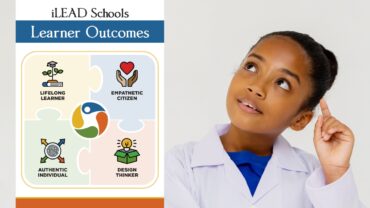iLEAD Lancaster Culture: Components of Social-Emotional Learning — Purpose

“The greatest thing in this world is not so much where we stand as in what direction we are moving.” ― Johann Wolfgang von Goethe
“Living with purpose.” The phrase evokes a range of thoughts and emotions, doesn’t it? When we choose to live with purpose, we choose to live proactively and decisively, rather than reactively.
As part of the iLEAD Lancaster approach to project-based learning with a social-emotional focus, one vital component is purpose. Within the social-emotional learning (SEL) framework, we recognize purpose as follows: You are oriented toward a future goal, and you can explain the reason for your goal.
To understand the importance of purpose, it’s helpful to examine another key element of iLEAD Lancaster’s approach to education: the 7 Habits of Highly Effective People. Successfully living with purpose encapsulates several of the 7 Habits: Being Proactive, Beginning With the End in Mind, and Putting First Things First. Understanding and incorporating those steps into your life connects directly to having a clear sense of purpose.
Let’s dive a little deeper into those Habits.
- Habit 1: Be Proactive — With this habit, a learner can say, “I am a responsible person. I take initiative, and I choose my actions and attitudes.” Through developing this habit, kids are able to learn responsibility, initiative, self-control and self-management.
- Habit 2: Begin with the End in Mind — With this, a learner can say, “I plan ahead and set goals. I do things that have meaning and make a difference. I look for ways to be a good citizen.” In turn, they are learning to have purpose and vision, and developing skills of planning, self-management and reflection.
- Habit 3: Put First Things First — By practicing this habit, a learner is saying, “I spend my time on things that are most important. I set priorities, make a schedule, and follow a plan.” This habit develops skills of prioritization, planning and time management, and follow-through.
These habits influence a child’s sense of purpose and attitude. When learners embrace the value of thinking and doing with purpose, they can develop stronger self-esteem, improve social skills and empathy, and are empowered to enrich the world around them.
When learners understand the importance of approaching things — from school projects to life goals — with proactivity and the end in mind, they begin to grasp the value of living with purpose.
Watch: On Purpose
RECENT POSTS

Schoolwide Learner Outcome: Lifelong Learners
At iLEAD, we believe that education should extend beyond traditional academic knowledge. Our purposeful approach revolves around the iLEAD Schoolwide Learner Outcomes, a collective vision that encapsulates our aspirations for… Read more

Habitat for Humanity Info Sessions for New Lancaster Development: September 8-11
Habitat for Humanity of Greater Los Angeles will be hosting information sessions this week for an upcoming development, Canyon Way. These sessions will provide details to community members interested in… Read more

iLEAD Lancaster School Picture Day: September 10
Get your big smiles ready! School picture day is coming up at iLEAD Lancaster on Wednesday, September 10. Stay tuned for more information.


